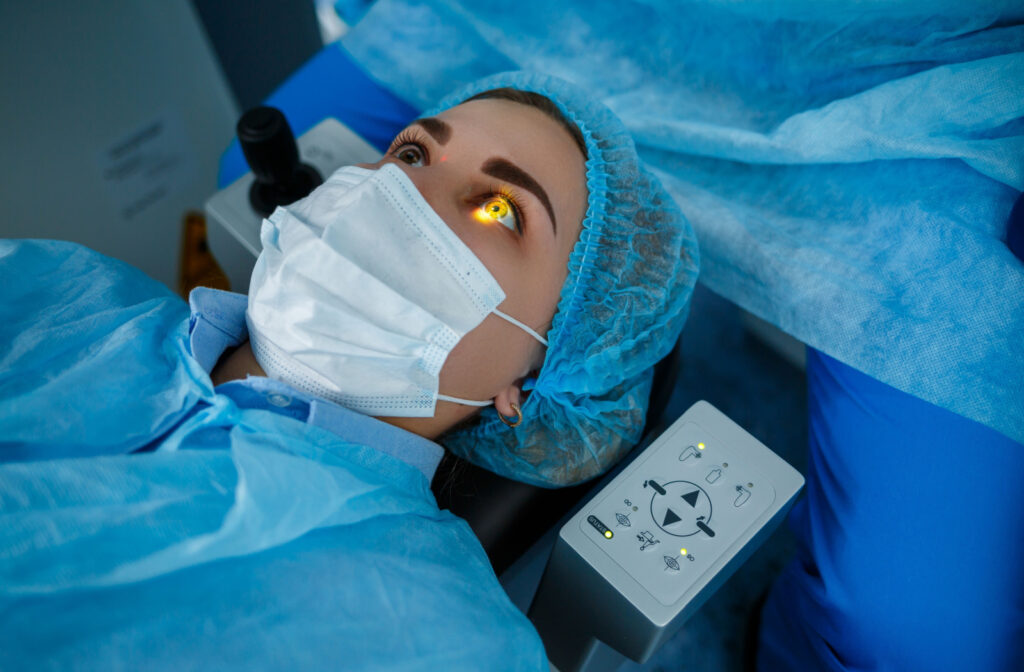Many people have questions about what the LASIK procedure is really like. One of the most common of these is whether you’re awake during the procedure.
You are awake during LASIK, but your surgeon will apply numbing drops that keep you comfortable and relaxed. Your cooperation and focus are part of the process, and our practice is built around helping you feel at ease from start to finish.
Your Awareness During the Procedure
It can seem daunting to remain awake for a medical procedure, but for LASIK, it is both necessary and manageable.
Why You Remain Awake for LASIK
In order to perform the procedure, your surgeon will need you to focus your eye on a target light. This allows the excimer laser to work accurately on your cornea. Your active participation is a simple yet important part of achieving your vision goals.
The Role of Numbing Drops & Relaxants
Before the procedure begins, your eye doctor applies powerful numbing drops to your eyes. These drops prevent you from feeling any pain. You may also receive a mild oral sedative to help you feel calm without putting you to sleep.
What to Expect from the LASIK Experience
Knowing the steps of the surgery can help you feel more prepared and confident. The entire process is efficient, often taking about 15 minutes.
How the Surgery Works
Your surgeon uses a laser to gently reshape your cornea, the clear front part of your eye. This reshaping corrects refractive errors like myopia (nearsightedness), hyperopia (farsightedness), or astigmatism.
The Sights & Sounds of the Surgery
During the procedure, you may see colorful lights and patterns as you look at the target light. You will also hear the sound of the laser, which many people describe as a soft clicking noise. These sensory experiences are a normal part of the process.
How Long the Procedure Takes
While you might be at the center for a couple of hours, the time you spend in the surgery suite is brief. The procedure itself typically takes only a few minutes per eye.

Your Comfort & Control During LASIK
It’s completely normal to have concerns about discomfort or involuntary movements like blinking. Your surgical team anticipates these concerns, and they make use of a range of methods used to help the procedure go smoothly.
Address Comfort During the Procedure
Numbing eye drops are an effective way to prevent pain during the surgery. You might feel a slight pressure sensation on your eye at certain points, but it’s not a painful feeling. Most people are surprised by how little they feel.
How We Account for Blinks & Eye Movement
You don’t need to worry about blinking at the wrong time. Your eye doctor will use a small instrument to gently hold your eyelids open. Additionally, modern lasers include sophisticated eye-tracking systems that follow your eye’s tiniest movements and pause if you move too much.
Life After Your LASIK Surgery
The recovery process after LASIK is usually quick, with many people noticing clearer vision within a day. Following your doctor’s instructions is key to a smooth and successful outcome. Proper aftercare supports your eye’s healing process.
The First 24 Hours Post-Procedure
Your vision may be a bit blurry or hazy immediately after the procedure. Your doctor will likely recommend you go home and rest your eyes for a few hours. You may experience some mild sensations as the numbing drops wear off, such as:
- Watery eyes
- Sensitivity to light, which is why quality sunglasses are often recommended
- A feeling like an eyelash is in your eye
Follow-Up Visits with Your Eye Doctor
You’ll have a post-operative follow-up appointment, usually the day after your surgery, to check on your vision and eye health. Your eye doctor will monitor your healing over the next few weeks and months. These scheduled visits are an important part of your long-term care.
Determine If LASIK Is a Fit for You
LASIK is a popular and effective vision correction procedure, but it’s not a suitable option for everyone. A thorough eye exam is the only way to know for sure if you’re a good candidate. Your individual eye health is the most important factor.
Signs You Are a Good Candidate
Good candidates for LASIK generally have a stable vision prescription for at least a year and good overall eye health. Factors like your corneal thickness, pupil size, and general health are also considered. Most candidates are over 18 years of age.
The Importance of a Consultation
A pre-operative consultation with your eye doctor is a necessary first step. This visit includes a comprehensive eye exam, during which we map your cornea and measure your prescription. It’s also a time for you to discuss your vision goals and lifestyle to see if LASIK aligns with them.
Exploring your vision correction options begins with a conversation about your eye health. At Total Vision Golden Hills, our team is dedicated to helping you understand your options for clearer vision. We can discuss whether LASIK, glasses, or contact lenses are the right choice for your eyes, so schedule a comprehensive evaluation with our team today.
Your journey to better sight starts with great information.



